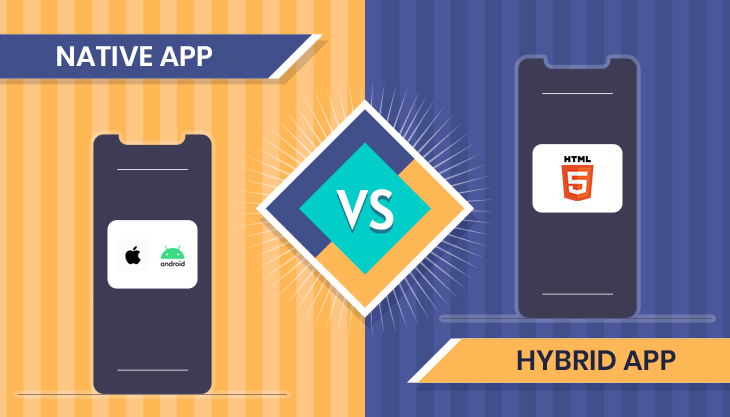Mobile app development is considered as one of the most dynamic business tools. They have evolved and emerged as the best way of building a connection with customers. Not only software products but even major services such as banking, shopping, food delivery, etc. all are also getting bound to Mobile Applications for both Android and iOS. Mobile applications allow companies to give their users convenience and updates on how and what is happening.
Business is directed and operated by constant innovations, thus numerous industries have been using mobile applications for at least more than five-plus years.
Few big companies today have opted for the mobile application instead of websites because of the tremendous growth of mobile users and easy accessibility level. Just through a few clicks, customers can use the applications easily and make them more responsive through push notifications, payment mode, etc.
Once you have decided to develop an app of your company or business organization, now the big question arises: What is best suitable for your idea? What kind of app is better native or hybrid? There are both pros and cons of Hybrid and Native. It also depends on the companies objectives, marketing strategies, business life cycle stages, goals, etc.
This blog from Techasoft will help you clear your doubts on Native applications and Hybrid Applications.
OVERVIEW:
The native app is developed for an appropriate platform either Android or iOS, whereas the hybrid app development method relies on cross-platform functioning.
That is native apps are created on programming languages which can be supported only by a particular platform. For example Java, Kotlin are customarily applied technologies for Android development and, for iOS - Objective-C, Swift languages.
For hybrid applications, mobile app developers should use multiple web developing languages and technologies such as HTML, CSS, and Javascript framework.
The mobile app developers deal with one centre code that incorporates both platforms. Hence the major difference between native apps and hybrid apps lies in the development process.
HYBRID APPS
The mobile application is a significant enhancement action for your business or organization. When you choose to build the hybrid application, you should learn its development process cycle, know about its features and find out the pros and cons.
This application is originally marked as a website that is put into the boxes. Thus every hybrid application has to use uniquely created APIs to seize the key features as well as engage the third-party means for it. These applications serve a web view control to hold the full-screen HTML and JavaScript files supporting the providing engine of the inbuilt OS browsers.
Technologies used for Hybrid Apps Development
Mobile development companies are working with a blend of technologies. Most popular frameworks used for hybrid app development are:
- React Native
- Xamarin
- Ionic
While comparing both hybrid apps and native apps, one should find all development processes, their pros and cons.
Advantages of Hybrid Apps Development
- Single codebase
- Lower cost
- Simpler to build and test
- Easier to maintain
- Faster delivery time
Disadvantages of Hybrid Apps Development
- Bounded efficiency
- Internet connection
NATIVE APPS
The important feature of the native app should be kept in mind while comparing native vs hybrid applications.
Native applications are developed particularly for only one platform, hence the applied technologies will vary. The android mobile application development is managed by the developers who can implement Java or Kotlin, and for iOS Swift or Objective-C will be needed.
Companies that regularly choose this method have to build 2 applications concurrently. It is clear that the developer's process is more long-drawn and requires more works and effort. But the final result is going to balance it. The customers can have a more responsive and faster experience. Good Performance and Animation along with data security is a beneficial feature besides complex developing processes.
Technologies for iOS development
- Objective-C
- Swift
Technologies for Android development
- Java
- Kotlin
Advantages of Native apps development
- Better performance
- Data protection
- Overall functionality
- Customer experience
- Comprehension
Disadvantages of Native apps
- Time and money-consuming
- Distributed codebase
Hybrid Apps VS Native Apps
When we have already checked all the pros and cons of the development process, you can notice the core difference between native and hybrid apps. Native app is 2 entirely separate lines of software designed for either the Android or iOS platform, while hybrid ones are the same software working on both platforms with a minor twist. This significant difference heralds the list of following criteria.
The companies need to set specific goals that are interested in. The native app vs hybrid app decision will impact the final outcomes. However there is not one perfect match, everything depends on the project. Therefore each kind of mobile app will be perfect for different cases.
The first step is to define your audience and what services you are going to render. If the application is content-oriented, the hybrid app framework will be a feasible choice. When your business is a financial organization, it is better to select the native application due to its better security.
Next step, plan your budget, hybrid app models will be less money and much time-consuming. You don’t need to have two different teams working on two different applications for Android and iOS.
Experienced and Well Skilled team can design a hybrid mobile app that will work well on both platforms
In the point of maintenance, it might be also easier to maintain one mobile application rather than two of them at the same time.
Lastly, all companies are squared for the best user experience. At times, the customers will not discern the difference between hybrid and native app experience. Both alternatives are constantly growing with new features and technologies. Native app models might perform a little bit faster as they are created for a certain platform. Yet, a hybrid app framework is often selected for its versatility.
SUMMARY:
Each type has benefits that are quintessential for certain projects. Further, you can choose the technology you prefer acknowledging your development capabilities. Exerting into account all these criteria, we can conclude that every approach furnishes some specific case. Your task will be to sketch down your most important criteria and don’t forget to consult the professionals in the related technology. If you are looking for the best Mobile app development company in Bangalore - Techasoft is always here to clear all your confusion about Mobile App Development and designs the best-suited app for your company.















Post Comments